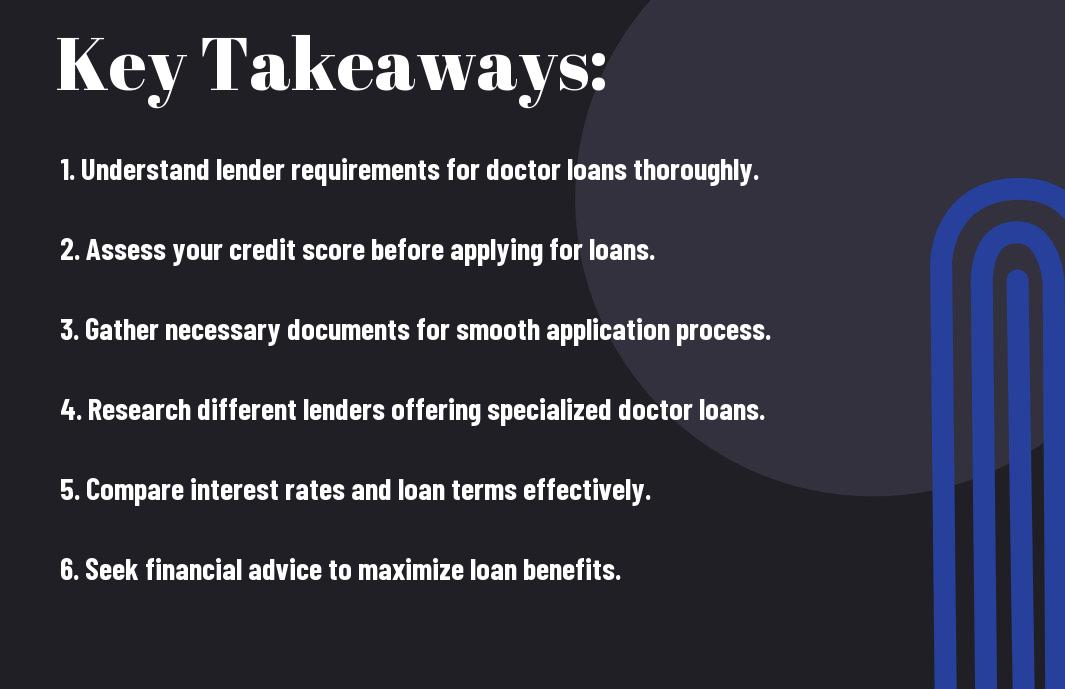It’s imperative for healthcare professionals like you to understand the specific steps to access doctor loans. These loans can be instrumental in helping you achieve your professional and personal goals, from buying a home to setting up a practice. By following these six professional steps, you can navigate the loan process with confidence, ensuring you secure the financing you need. This guide will provide the expertise you require to make informed decisions and capitalize on the opportunities available to you as a medical professional.
Understanding Doctor Loans
As a healthcare professional, you may find that traditional loan options do not always cater to your unique circumstances. Doctor loans are tailored to meet the specific financial needs of medical professionals, enabling you to secure financing without the extraneous challenges often faced by other borrowers.
What Are Doctor Loans?
Among the specialized financial products available, doctor loans are designed specifically for medical professionals, including physicians, dentists, and veterinarians. These loans offer flexible terms and conditions, catering to the unique financial situations that medical practitioners encounter as they initiate on their careers.
Key Advantages of Doctor Loans
One of the most significant benefits of doctor loans is the ability to obtain financing with little or no down payment, allowing you to invest in your future without depleting your savings. Additionally, these loans often come with competitive interest rates and favorable repayment terms, making them an attractive option for healthcare professionals.
Advantages of doctor loans extend beyond just flexible financing. Many lenders are willing to consider your future earning potential rather than solely focusing on your current income. This allows you to secure a loan even if you recently graduated or are yet to begin your practice. Furthermore, doctor loans typically skip the requirement for private mortgage insurance (PMI), saving you additional costs and making homeownership more accessible. With these advantages, accessing the financial resources you need becomes significantly easier.

Eligibility Criteria for Doctor Loans
Assuming you are a healthcare professional seeking a doctor loan, you should be aware of the eligibility criteria that lenders typically require. These loans are specifically designed for physicians, dentists, and other qualified medical professionals. Generally, your professional degree and specialty influence your access to these financial products. Additionally, lenders may consider the stage of your career, your income potential, and your overall financial profile when evaluating your application.
Professional Qualifications
Between various healthcare fields, lenders typically prioritize applicants with advanced medical degrees, such as MDs, DOs, DMDs, or other specialized training. Your qualifications, along with your residency or fellowship status, play a significant role in determining your eligibility. Lenders often favor candidates who are currently practicing or on the path to join the workforce, as this improves stability and reduces risk from the lender’s perspective.
Financial Considerations
By addressing financial aspects, you can better prepare yourself for qualifying for a doctor loan. Lenders assess your income level, existing debts, and credit score to determine your financial health. A higher income, lower debt-to-income ratio, and good credit history can enhance your eligibility, allowing you to secure favorable loan terms.
Criteria such as income stability and existing financial obligations are important when applying for a doctor loan. Lenders generally prefer applicants who demonstrate a solid income trajectory, often associated with the unique earning potential of healthcare professionals. Moreover, being aware of your credit score can help ensure that you are in the best position to apply, as a score above 680 is often favorable. Additionally, providing proof of future income, such as contract offers or employment letters, can help solidify your case and enhance approval odds.

Steps to Accessing Doctor Loans
For healthcare professionals, accessing doctor loans can provide significant financial support on your career journey. By following a systematic approach, you can navigate through the process efficiently, ensuring your loan application is as strong as possible. From researching lenders to managing repayments, each step is vital for securing the funding you need.
Researching Lenders
One of the first steps you should take is to research lenders that specialize in doctor loans. This means looking for institutions with experience in serving healthcare professionals, as they often offer tailored options that meet your unique financial needs.
Preparing Documentation
Against the backdrop of securing a doctor loan, preparing your documentation is critical. You will need to gather various financial statements, proof of income, and any relevant employment letters to demonstrate your financial stability to potential lenders.
Indeed, meticulous preparation of your documentation can significantly ease the application process. Ensure that you have recent pay stubs, tax returns, and a summary of your debts. This comprehensive approach not only reflects your financial responsibility but also builds trust with lenders, showcasing your commitment to managing your loan responsibly.
Application Process
To successfully navigate the applications process, you must submit your documents and financial details accurately. This entails filling out forms and possibly providing additional information to ensure a smooth review by the lender.
Researching the application process in advance can save you time and stress. Many lenders have online portals for submissions, where you can track your application status. Being prompt with your responses to any lender inquiries is vital, as it can expedite approval and ultimately, your access to funds.
Comparing Loan Offers
Loan offers will vary widely across different lenders, which makes it vital to compare them thoroughly. Take notes on interest rates, loan terms, and other fees to make informed decisions that best suit your financial goals.
| Criteria | Lender A |
| Interest Rate | 3.5% |
| Loan Term | 15 years |
| Processing Fees | $500 |
Considering all elements within your loan offers can lead to significant savings. Evaluating monthly payments and total interest paid over the loan’s life can help you select the most beneficial option for your situation.
Closing the Loan
Accessing your funds involves the final closing of the loan, where you will review and sign documents. At this point, it’s vital to confirm all terms are as expected before moving forward.
Due to the importance of understanding the terms of your closing documents, don’t hesitate to ask questions. Make sure you are clear on details such as the timeline for funding and your repayment schedule. This preparedness can help avoid surprises down the road.
Managing the Loan Repayment
On the horizon of managing your loan, establishing a solid repayment strategy is key. Create a budget that includes your monthly loan payments to maintain financial stability.
Doctor loans can often come with flexible repayment options, and it’s vital that you take advantage of these features. Setting up autopay or quarterly reviews of your financial situation can help ensure that you stay on track with your repayments, reducing the risk of default while alleviating stress associated with managing your debt.
Common Misconceptions About Doctor Loans
To navigate the world of doctor loans effectively, it’s crucial to dispel some common misconceptions. Many believe that these loans are only available to those with perfect credit scores or that they come with exorbitant interest rates. In reality, doctor loans are specifically designed for healthcare professionals and often offer favorable terms, including minimal down payments and competitive rates, even for those with less-than-perfect credit. Additionally, you might think that these loans are exclusively for purchasing homes, but they can also be utilized for refinancing existing mortgages, opening up more financial opportunities for you.
Additional Resources for Healthcare Professionals
Keep exploring the wealth of resources available specifically for healthcare professionals seeking doctor loans. Utilize online platforms, such as professional organizations and financial advisory websites, that cater to your unique needs. These resources often provide valuable insights, industry-specific loan options, and educational materials to guide you through the entire financing process. Engaging with peer networks and utilizing webinars can also enhance your understanding of financial strategies tailored to your profession. By leveraging these tools, you can make informed decisions that align with your financial goals.
Conclusion
The journey to financial empowerment through doctor loans is accessible when you follow these six proactive steps. By understanding your unique financial position, researching lenders, preparing the necessary documentation, utilizing your professional network, seeking tailored advice, and maintaining thorough communication with your lender, you position yourself for success. Empowering yourself with knowledge and resources not only streamlines the application process but also lays the groundwork for a stable financial future in your healthcare career.
FAQ
Q: What are the specific eligibility requirements for doctor loans?
A: Doctor loans typically have unique eligibility requirements tailored for medical professionals. Generally, you must be in a qualifying profession such as a physician, dentist, or veterinarian, and you may need to provide proof of your employment or residency program. Many lenders also consider the type of medical specialty, loan amount, and your credit score. Some loan programs may even offer favorable terms for new graduates who have yet to establish a credit history. Always check with individual lenders for their specific requirements.
Q: How do I compare different doctor loan options effectively?
A: To compare doctor loan options efficiently, start by listing all available programs and their terms. Look for factors such as interest rates, repayment periods, and any fees associated with the loans. It’s also wise to inquire about the down payment requirements and whether they offer benefits like no private mortgage insurance (PMI). Utilize comparison tools online or consult with financial advisors who specialize in loans for healthcare professionals to ensure you’re assessing your choices comprehensively.
Q: Can I use a doctor loan for purposes other than purchasing a home?
A: Doctor loans are primarily designed for home purchases, but they can also potentially be utilized for refinancing existing loans or sometimes for other related expenses, depending on the lender’s policy. In certain cases, you may be able to use a doctor loan for renovating a home or for a new property investment. Always clarify with your lender to understand what is permissible under the loan agreement to ensure you’re making the most informed decision.




